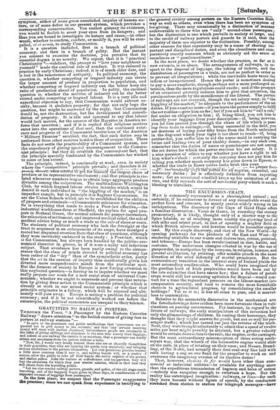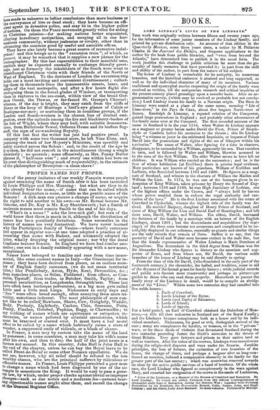THE EXCURSION -TRAIN. MAN is commonly represented as a shortsighted
animal ; and certainly, if he endeavour to foresee of any remarkable event the
perfect form and pressure, he mostly proves widely wrong in his
anticipations. The discovery of the Cape of Good Hope offers a familiar illustration : Vasco de Game, in rounding the stormy promontory, it is likely, thought only of a shorter way to the Spice Islands, or of reaching more readily the glowing land of rich silks and orient pearl, in lieu of opening a mighty field on
which British adventure and heroism would be hereafter signal- ized. By this single discovery, and that of the New World—by opening pathways for the products of the East and West—by rendering available to our wants and desires teas, cotton, potatoes, and tobacco—Europe has been revolutionized in diet, habits, and costume. The unforeseen changes effected in war by the use of gunpowder, in navigation by the compass, in religion, science, and general civilization, by printing, offer notable proofs in the same direction of the utter infirmity of mortal prescience. But the extraordinary transition in the internal state of Ireland yields the most astounding confirmation. Who could have imagined that the gordiart knot of Irish perplexities would have been cut by the late calamities that have smote her ; that a failure of potato crops would still her menacing agitation for Repeal—would con- vert for a time the resiundant pressure on the labour-market into comparative scarcity; and tend to remove the most formidable obstacle to agricultural progress, by consolidating the smaller holdings? Yet so it is ; it has all come to pass, and is marvel- lous to contemplate. Relative to the memorable discoveries in the mechanical arts the foreshadowings have seldom been more fortunate than in vati- cinations on passing occurrences. For instance, in regard`to the future of railways, the early manipulators of this invention had only the glimmerings of children. In casting their horoscope, they thought that they might answer for goods, but not so well forpas- senger traffic ; which has turned out just the reverse of the truth. Next, they were brought reluctantly to admit that a speed of twelve miles per hour might possibly be attained, but a greater velocity would be certain destruction to the rails, the engine, or the carriages. But the most extraordinary misconception of these erring sooth- sayers was, that the wheels of the locomotive engine would slide on the rails, in place of rotating on their axes; and Messrs. Brand- ling, of the North, had actually their first coal-way line laid with rails having a cog on one flank for the propeller to work on and overcome the imaginary evasion of its tractive duties ! That, however, ehenz ins 4e fir would have -other than com- mercial or industrial utilities—be available for anything more- than the expeditious transmission of bagmen and bales of cotton —nobody was sanguine enough to entertain a hope. But the reality has outstripped imagination : railways, or lines—for such they have become without figure of speech, by the conductors seen made to subserve to loftier conclusions than mere business or tie conveyance of live or dead stock; they have become an effi- cient egent in detective police, and may be in the higher police- of nations. On them the Peace movement greatly relies for aiding its Christian mission—for making nations better acquainted, allaying hereditary antipathies, and merging all in one har- monious community, without jealousies or rivalry, other than in advancing the common good by useful and amicable offices. They have also lately become a great source of recreative indul- gence: and this brings us to the "excursion train "; of which, en nt, it may be remarked that it supplies a new phrase for the exicograPher. By this last superaddition to their manifold uses, capitals may be expected annually to exchange friendly greet- ings, just as formerly the inhabitants of the South were wont to interchange Christmas visits with their friends of the North or West of England. To the denizens of London the excursion-trip bolds out a most inviting and convenient divertisement ; collect- ing them in thousands from the innumerable streets, lanes, and alleys of the vast metropolis, and after a few hours flight dis- emboguing them-in the forest glades of Windsor, or transporting them in raptures to the sea-coast, within view of the broad Ger- man Ocean, the Downs, or far-famed St. George's Channel; whence, if the day is bright, they may catch from the cliffs of Dover or the keep of Hastings a bird's-eye glance of Calais or Boulogne-snr-mer ; or scattering them in countless groups, if the London and South-western is the chosen line of diurnal emi- gration, over the uplands among the firs and blackberry-bushes of the Isle of Wight, where they may hail, with suitable demonstra- tions, from Bullstrode Tower, Osborne House and its leafless flag- staff, the sign of co-wandering Royalty.
Of this last feat the writer has just had positive proof. In company with some two thousand more, he left Nine Elms, and, pursuing the track of her Majesty's Ministers, was speedily and safely carried across the Solent : and, to the credit of the age be it spoken, he did not remark in the miscellaneous throng a single disorderly ; no quarrels ; none offensively, as Mrs. Fanny Butler phrases it, "half-seas over" ; and every one within ken bore on Ins crest that distinguishing mark of respectability, in the estimate of the philosopher of Brompton—a clean shave !



























 Previous page
Previous page